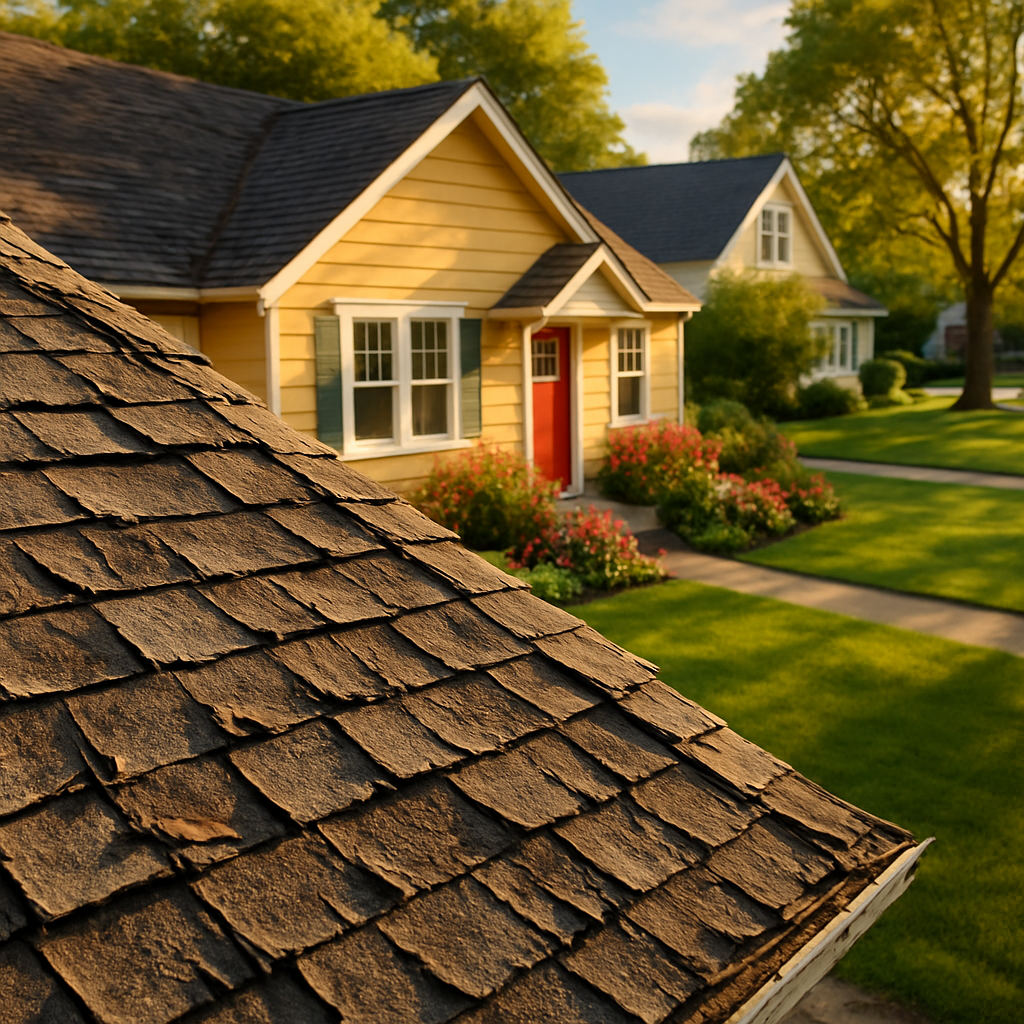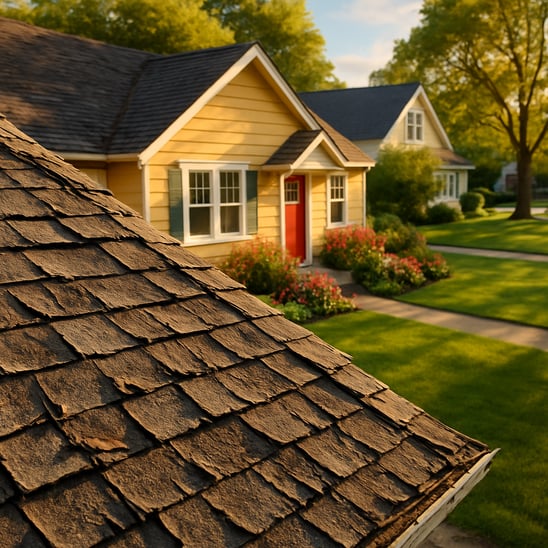Should You Fix Your Roof Before Selling Your House?

Selling your home is stressful enough without worrying about your roof snagging the deal. For many homeowners, this question often comes up: Do I need to fix my roof before I list, or can I sell the house as-is?
At Happy Roofing, we've worked with both sellers and buyers facing situations with similar questions. Some homes had obvious roof problems, like missing shingles or active leaks. Others weren't sure how much life the roof had left before they had to consider repairs.
The truth is, your roof plays a bigger role in the selling process than most homeowners realize.
In this article, we'll walk through why roof condition matters to buyers, inspectors, and lenders, and how it can affect your home's value. We'll also cover what your options are if repairs or replacement are necessary in the near future.
Table of Contents
- The Importance of Roof Condition When Selling Your Home
- What Roof Issues Can Affect a Home Sale?
- Should You Fix Your Roof Before Listing Your Home?
- How to Determine if Your Roof's Condition Will Affect Your Sale
- When is Roof Replacement a Better Option Than Repairs?
How Important is Roof Condition When Selling a Home
When you're preparing to sell, the condition of your roof can play a surprisingly big role in how easily and smoothly your house sells. Buyers, inspectors, and lenders all see the roof as a major factor in determining the home's value, safety, and insurability.
Here's how roof condition is viewed by each party involved:
- How buyers see it: For most buyers, the roof is part of their first impression. A roof that looks aged, worn, or poorly patched can raise immediate concerns. On the other hand, a roof in good condition can boost confidence and make your home feel "move-in ready."
- How inspectors view it: Home inspectors look at the roof during their assessment. While they're not roofing specialists, missing shingles, signs of leaks in the attic, or visible sagging are almost guaranteed to show up in the inspection report. Buyers often use these findings as leverage to negotiate repairs or push for a lower price.
- How lenders factor it in: The roof can also impact financing. Appraisers consider roof condition when determining value, and in some cases, lenders may require repairs or even a roof replacement before approving a mortgage. A roof in poor shape can put the entire sale at risk.
A roof in good condition reassures buyers, strengthens inspection reports, and helps avoid financing hiccups. A roof in poor condition, on the other hand, can delay or lose a sale.
What Kind of Roof Issues Could Affect a Home Sale?
Roof issues that commonly affect a home sale include an aging or visibly worn roof, missing shingles, obvious patchwork repairs, interior signs of leaks like water stains, and more serious concerns such as structural sagging or poor ventilation.
Some of these problems may only influence a buyer's decision, while others can raise inspection and financing red flags that can slow down or even cause a sale to fall through.
How Does Age and Visible Wear Affect a Home Sale?
Curling shingles, faded color, or excessive granule loss are signs of age that can affect buyer confidence and lower offers.
Even if a roof isn't leaking, visible wear can send a message that a replacement may be needed soon. Asphalt shingles typically last 15–30 years, depending on quality and installation, and buyers often factor age into their decision-making.
Likelihood to Affect Home Sale: High
A visibly worn roof could stick out to potential buyers, especially when the surrounding homes have newer roofs that are in better shape:

How Do Missing Shingles Affect a Home Sale?
To a homebuyer, missing shingles can raise immediate concerns about the age, safety, and remaining lifespan of the roof. While a few missing shingles might not seem like a big deal, they can be early signs of potential leaks and needed repairs.
Likewise, poorly matched patchwork repairs or multiple small fixes scattered across the roof may give the impression that the roof has had repeated problems. Even if those repairs were effective, it could show that the roof is aging, and a repair may be around the corner.
Likelihood to Affect Home Sale: Moderate

How Do Signs of Leaks Affect a Home Sale?
Nothing spooks a buyer faster than seeing water stains on ceilings or walls. Inspectors almost always spot and call these out, which can force sellers into repair negotiations, credits at closing, or backing out of the sale completely.
Even if the leak was minor and repaired long ago, visible stains raise concerns about hidden damage or mold that's been accumulating silently behind the scenes.
Likelihood to Affect Home Sale: High

How Does Structural Sagging Affect a Home Sale?
A warped or sagging roof is a safety concern and is typically noticed right away. Both buyers and inspectors will call this out, and it can potentially be used to negotiate a lower selling price.
Sagging rooflines and uneven surfaces can also be a sign of poor attic ventilation. These issues could lead to potential structural or long-term damage if they're ignored for too long.
Buyers and lenders take this seriously because they often indicate that costly repairs will be necessary. In many cases, sagging or poor ventilation can shorten the life of the entire roof system and even impact the safety of those living in the home.
Likelihood to Affect Home Sale: High

Do I Need to Fix My Roof Before Selling My Home?
The short answer is not always. Whether you need to repair or replace your roof before selling depends on its condition, your local market, and how you want to position your home to buyers. In some cases, you can sell without making major fixes or just offer a credit to the buyer for the cost of the necessary repairs. But in others, the roof can make or break the deal.
You have 3 options in terms of how to proceed with your roof issues.
What's the Difference Between Roof Repair, Disclosing Condition, and Offering a Credit?
When roof issues do exist, sellers usually have three options when listing their home for sale:
- Repair/Replacement: Fixing localized problems, such as replacing damaged shingles, can reassure buyers and smooth the inspection process. If the issues are widespread or the roof is approaching the end of its life, a replacement could add value to the home and help the sales process go smoothly.
- Disclose: If you don't want to make the repairs or replacement, disclosing the roof's condition upfront builds trust and prevents surprises later. This often leads to lowering the asking price or offering a credit.
- Offer a credit: Instead of handling the work yourself, you can offer the buyer a credit at closing to cover repairs or replacement. This approach appeals to buyers who want control over the contractor and materials. This is also beneficial for sellers who would rather not take the time to plan a replacement for a home they're about to move out of, and aren't as worried about getting the highest possible price.
When Does It Make Sense to Sell a Home Without Replacing the Roof?
If your roof is still in reasonably good shape, with only minor wear and no active leaks, you may be able to list and sell the home as-is. Buyers may accept an older roof if inspection reports are clean and the home is otherwise well-maintained. In strong seller's markets, where buyers have fewer options, some are willing to overlook an aging roof to secure a property.
Here are some situations where selling without major roof work can make sense:
- The roof is aged but sound: Cosmetic wear like fading or light granule loss isn't usually a deal breaker if there are no leaks and the roof is structurally sound.
- Inspection reports come back clean: A roof that passes inspection without issues builds buyer confidence, even if it's not brand new.
- You've kept up with maintenance: Records of regular inspections, any repairs, and previous inspection reports can reassure buyers that the roof has been cared for, and help obtain a cost closer to what you're asking.
- You're in a strong seller's market: When inventory is low, buyers may be more flexible about roof age and condition if their other options are limited. This can give you more wiggle room as a seller during negotiations.
When Does It Make Sense to Replace the Roof Before Selling?
Replacing the roof before listing your home can save time during the selling process, attract more buyers, and potentially boost your selling price. Listing your home with a brand new roof could put you at an advantage during negotiations.
Here are some situations where replacing your roof before selling your home could make sense:
- The roof is at the end of its lifespan: If your roof is 20+ years old, even without major leaks, most buyers (and their lenders) will see replacement as inevitable. Taking care of it upfront removes a major objection and could speed the process along.
- There are active leaks or visible interior damage: Water stains, active leaks, sagging rooflines, or mold tied to the roof will almost always show up in inspection reports and negatively affect negotiations if not addressed.
- You're selling in a competitive market: A new roof is a strong selling point and can set your home apart from others, especially if buyers have multiple choices at the time. Some buyers may prefer moving into a home with a brand new roof that they won't have to worry about for years.
- You want a smoother closing: By handling the replacement ahead of time, you avoid needing to offer credits, drastically lowering the asking price, or receiving last-minute repair demands that can complicate the deal.
What Should I Do If I'm Unsure About My Roof Condition Before Selling My Home?
If you're not sure whether your roof will be a friction point in the sale of your home, you can always get a pre-sale assessment for a better understanding of the condition of your roof. There are several ways to get clarity before you list your home:
- Get a pre-listing roof assessment: A professional roofing contractor can inspect your roof in-depth, document its condition, and give you an honest opinion on whether repairs or replacement are needed. Having a roofer's report in hand helps you make informed decisions and can also reassure buyers during negotiations.
- Talk to your realtor: Experienced agents deal with roof-related concerns often. They can advise you on whether it's better to handle minor repairs, get a replacement, or offer a credit to buyers at closing. Their insight will also reflect local market trends and what buyers in your area are willing (or not willing) to accept.
When Should You Repair Vs. Replace Your Worn Roof?
Your roof can be one of the biggest factors contributing to your home sale. Even if it's not perfect, knowing whether it needs repairs or replacement can save you from last-minute surprises during inspection or negotiation.
If you suspect your roof needs attention and are weighing your options, the next step is understanding when a repair is enough and when replacement makes more sense. We break it all down in our guide Roof Repair vs. Replacement: What Homeowners Need to Know. This article will give the information you need to make a well-informed decision for your situation.
If you'd rather not make that decision on your own, we're here to help. A professional roof assessment will give you a straightforward evaluation of your roof's condition, so you can move forward with confidence in your home sale.
The Author: Pedro Toledano
Happy Roofing is a trusted roofing company dedicated to providing top-quality roofing services to residential and commercial clients. With years of experience, they specialize in roof installations, repairs, and maintenance, ensuring durability and customer satisfaction. The team is known for their professional approach, timely service, and attention to detail. Happy Roofing prides itself on using high-quality materials and offering competitive pricing. Follow their Facebook page for updates on projects, customer testimonials, and tips on maintaining your roof in excellent condition.





